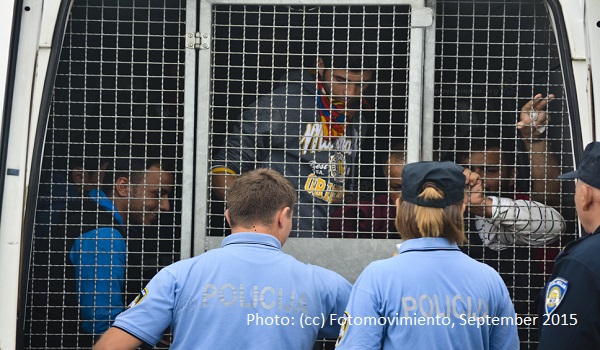Violations of the rights of people on the move along the Balkan Route continued in recent weeks with multiple pushbacks involving brutal violence across different borders, including from Croatia, Bulgaria, North Macedonia, Romania, and evictions of makeshift shelters in Bosnia and Herzegovina. In a letter to the European Commission, ECRE and other NGOs have again highlighted the need for an independent border monitoring mechanism and expressed concerns regarding the national implementation in Croatia.
In May, the Border Violence Monitoring Network (BVMN) collected testimonies about five pushback cases from Croatia to Bosnia and Herzegovina (BiH) that affected a total of 39 people, including children at the age of five and six. The people who were pushed back were apprehended by Croatian police in different parts of the country, including close to the Slovenian border, and they were all pushed back to Una-Sana Canton, the region hosting the largest share of people on the move in BiH. In four of the five incidents, those who were pushed back were subjected to violence by Croatian police officers, including threatening with guns, beatings with wooden sticks, theft and destruction of personal belongings, being forced to undress, verbal abuse, water immersion, reckless driving and exposure to extreme temperatures while being driven to the border. The violent abuse was followed by forced pushbacks across the border to BiH in remote areas meaning the people affected had to walk for hours to reach civilisation while being exhausted, injured, and or without clothes. One respondent who was pushed back on 21 May together with two others recalls: “When the policeman came, they took out their guns and loaded it like putting in a bullet and shouted ‘sit down’” (sic). Then, the three people were forced into a police van and driven to the border with the AC turned on full heat, which made them feel as if they were suffocating. Finally, the group was forced to stand at the edge of a river bank that marks a natural border between Croatia and BiH while the police officers were making jokes about pushing them into the water. The respondent recalled: “First they tried to push all of us in the river, then my sister cried. Then they pushed me I thought ‘if I don’t go, they will push all of us in the water’ so I entered” (sic). Unable to swim he managed to stay afloat by clinging to a tree branch.
A recent report by the BVMN concludes that 87% of pushbacks carried out by Croatian authorities in 2020 involved one or more forms of violence and abuse which according to the BVMN “amounts to torture or inhuman treatment.” In total, the network recorded testimonies of 124 pushbacks from Croatia in 2020 affecting 1,827 people.
In a letter sent to the European Commission, ECRE and other NGOs have expressed their concerns about the “ongoing discussions with the Croatian authorities on the long-overdue establishment of the national independent monitoring mechanism – a requirement of EU funding that Croatia received in 2018.” The letter highlights that any agreement on a national mechanism in Croatia that falls short of meeting the necessary standards would “set a bad precedent” and outlines that “A monitoring mechanism must be independent in law and practice; equipped with the necessary means to ensure that violations of rights at and in proximity to EU borders are recorded; that those responsible are held to account; and that justice for the individuals affected is guaranteed. The European Commission should not condone or support – either politically or financially – any mechanism that falls short of these standards.”
The ongoing rights violations at Croatian borders are not isolated, and violent pushbacks have in recent weeks also been reported from other borders along the Balkan Route. This includes two pushbacks involving a total of 12 people from North Macedonia to Greece and five pushbacks involving a total of 38 people from Bulgaria to Turkey – testimony reports collected by members of the BVMN lay out the severe violence perpetrated during these operations. Further, the Asylum Protection Center, an ECRE member, reports of brutal pushbacks from Romania to Serbia.
However, the politics of exhaustion towards people on the move in the region are not limited to the treatment at borders as recent evictions of makeshift camps in BiH highlight. On 1 June, four squats in Bihać were evicted by local authorities and 62 people, mostly Pakistani and Afghan nationals, were transferred to the temporary Lipa camp. In the early morning of 28 May, the so-called jungle, providing temporary shelter to about 300 people in makeshift tents scattered in forests and fields south of Bihać was evicted and burned down by Bosnian authorities. According to local media, about 255 people were transferred to Lipa while others went into hiding. Similar operations have taken place in various locations in recent weeks, including in the jungle and in Bihać. No Name Kitchen (NNK), an NGO providing support to people on the move in BiH and elsewhere, reports of increasing repression by local authorities in Una-Sana Canton towards people on the move, including activities that imped the provision of humanitarian assistance. In a tweet, NNK describes the situation: “Police in Bihac has burned people’s belongings after the eviction today. People are not allowed to rent a home. Camps full. Squats evicted. If they ask for asylum in BiH, few chances to get it. When they try to come to EU, police from EU push them back with violence.”
For further information:
- ECRE, PRAB: New Report on Pushbacks Across Six European Countries, May 2021
- ECRE, Balkan Route: Communicated Cases against Hungary, Submissions to the Universal Periodic Review on Hungary, Violent Pushbacks Reported in Croatia and Bosnia and Herzegovina, April 2021
- ECRE, Balkan Route: Deterrence, Abuse and Illegality in the Forgotten Corner of Europe, April 2021
Photo: (CC) Bastian Walthierer, March 2016
This article appeared in the ECRE Weekly Bulletin. You can subscribe to the Weekly Bulletin here.

